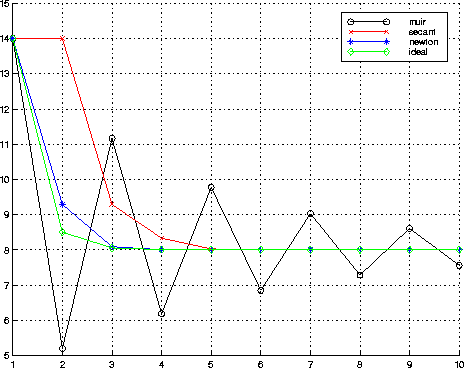If we consider the general form of the square root iteration
![]()
![]()
 |
(7) |
|
sqroot
Figure 2 Convergence plots for different recursive algorithms, shown in Table 1. |  |
The possible selections for ![]() from Table 1
clearly show that the recursions
described in the preceding subsection generally have a linear
convergence rate (that is, the error at step n+1 is proportional to
the error at step n), but can converge quadratically for an
appropriate selection of the parameter
from Table 1
clearly show that the recursions
described in the preceding subsection generally have a linear
convergence rate (that is, the error at step n+1 is proportional to
the error at step n), but can converge quadratically for an
appropriate selection of the parameter ![]() , as shown in
Table 2. Furthermore, the convergence is faster
when
, as shown in
Table 2. Furthermore, the convergence is faster
when ![]() is closer to
is closer to ![]() .
.
We therefore conclude that Newton's iteration has the potential to
achieve the fastest convergence rate. Ideally, however, we could use
a fixed ![]() which is a good approximation to the square root. The
convergence would then be slightly faster than for the Newton-Raphson
method, as shown in Figure 2.
which is a good approximation to the square root. The
convergence would then be slightly faster than for the Newton-Raphson
method, as shown in Figure 2.